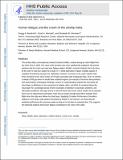| dc.contributor.author | Bendrick, Gregg A. | en_US |
| dc.contributor.author | Beckett, Scott A. | en_US |
| dc.contributor.author | Klerman, Elizabeth B. | en_US |
| dc.date.accessioned | 2017-06-15T18:28:57Z | |
| dc.date.issued | 2016 | en_US |
| dc.identifier.citation | Bendrick, Gregg A., Scott A. Beckett, and Elizabeth B. Klerman. 2016. “Human fatigue and the crash of the airship Italia.” Polar research 35 (1): 27105. doi:10.3402/polar.v35.27105. http://dx.doi.org/10.3402/polar.v35.27105. | en |
| dc.identifier.issn | | en |
| dc.identifier.uri | http://nrs.harvard.edu/urn-3:HUL.InstRepos:33029719 | |
| dc.description.abstract | The airship Italia, commanded by General Umberto Nobile, crashed during its return flight from the North Pole in 1928. The cause of the accident was never satisfactorily explained. We present evidence that the crash may have been fatigue-related. Nobile’s memoirs indicate that at the time of the crash he had been awake for at least 72 h. Sleep deprivation impairs multiple aspects of cognitive functioning necessary for exploration missions. Just prior to the crash, Nobile made three command errors, all of which are of types associated with inadequate sleep. First, he ordered a release of lift gas when he should have restarted engines (an example of incorrect data synthesis, with deterioration of divergent thinking); second, he inappropriately ordered the ship above the cloud layer (a deficiency in the assessment of relative risks); and third, he remained above the cloud layer for a prolonged period of time (examples of attention to secondary problems, and calculation problems). We argue that as a result of these three errors, which would not be expected from such an experienced commander, there was no longer enough static lift to maintain level flight when the ship went below the cloud layer. Applying Circadian Performance Simulation Software to the sleep–wake patterns described by Nobile in his memoirs, we found that the predicted performance for someone awake as long as he had been is extremely low. This supports the historical evidence that human fatigue contributed to the crash of the Italia. | en |
| dc.language.iso | en_US | en |
| dc.relation.isversionof | doi:10.3402/polar.v35.27105 | en |
| dc.relation.hasversion | http://www.ncbi.nlm.nih.gov/pmc/articles/PMC5421565/pdf/ | en |
| dash.license | LAA | en_US |
| dc.subject | Sleep | en |
| dc.subject | Nobile | en |
| dc.subject | polar exploration | en |
| dc.subject | aviation history | en |
| dc.subject | human error | en |
| dc.subject | mishap | en |
| dc.title | Human fatigue and the crash of the airship Italia | en |
| dc.type | Journal Article | en_US |
| dc.description.version | Version of Record | en |
| dc.relation.journal | Polar research | en |
| dash.depositing.author | Klerman, Elizabeth B. | en_US |
| dc.date.available | 2017-06-15T18:28:57Z | |
| dc.identifier.doi | 10.3402/polar.v35.27105 | * |
| dash.contributor.affiliated | Klerman, Elizabeth | |


